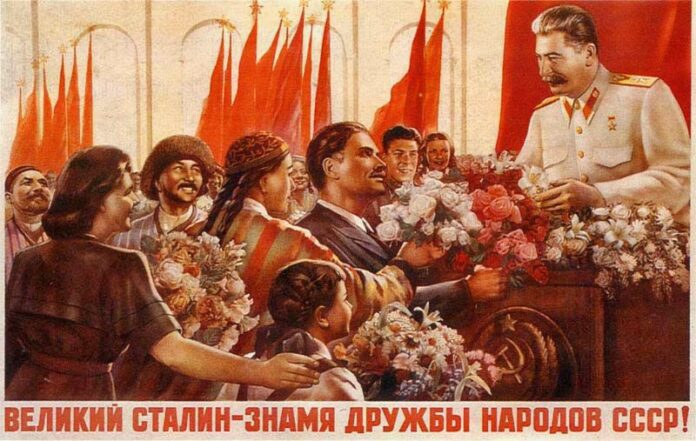
Socialistisk Biblioteks Tidslinje med links til begivenheder og personer i 1953.
Se også Index over personer, organisationer/partier og værker (som bøger, malerier, mm.), steder, begivenheder, mv., der er omtalt på hele Tidslinjen, titler og indhold på emnelisterne osv.
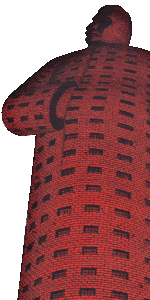
5. marts 1953
J.V. Stalin dør (alt for sent) (født 21. december 1878, officielt 1897).
Se:
- Josef (Vissarionovitsj Dsjugasjvili) Stalin (Leksikon.org)
- Josef Stalin. Af Niels Erik Rosenfeldt (Denstoredanske)
- Artikler om Stalin + Artiklar om stalinismen + Böcker om stalinismen (Marxistarkiv.se)
Stalinismen og dens rødder. Af Marie Frederiksen
(Marxisme, nr.1, efterår 2019, s.3-22; online på Marxist.dk).
“De borgerlige og stalinisterne har fra hver deres side forsøgt at gøre Stalin ansvarlig for alt det, der skete i Sovjetunionen. Det er vores tese, at den enorme fremgang i Sovjetunionen skete på trods af Stalin og stalinismen.”
Var Stalin så slem? Af Anders Lundkvist (Modkraft/Kontradoxa, 27. juni 2014). “Ny bog søger at stille Stalin i et mere positivt lys. Det lykkes ikke, men en række interessante spørgsmål rejses.”
Tidsdoku. Stalin – Tsaren som bar titlen Generalsekretær. Af Inge K. Hansen og Alfred Lang (Autonom Infoservice, 5. marts 2003). “Stalin døde den 5. marts 1953. Ingen anden erklæret kommunist har formået at skade socialismens sag mere end manden fra det solrige Georgien – Josef Vissarionovitsj Dsjugasjvili Stalin, blandt kampfæller kaldt ‘Koba’ …”
Stalin, 50 år efter en tyrans død, del 1. Af Alan Woods + del 2 + del 3 (Revolution, april-maj 2007). “I årtier havde den stalinistiske propagandamaskine fremført myten om Stalin som ‘Lenin af i dag’, der angiveligt skulle have anført bolsjevikpartiet sammen med Lenin. Men alt dette var blot en konstruktion for at retfærdiggøre en tyrans magtovertagelse, der ødelagde Lenins parti, likviderede de politiske erobringer fra oktoberrevolutionen og fik den Kommunistiske Internationale til at lide skibbrud.”
Stalin – En biografi. Af Peter Mouritsen (Historie-online.dk). Anmeldelse af Bent Jensens bog (Gyldendal, 2005, 352 s.). “Bogen giver med sine 309 side plus litteratur og kilder et godt overblik over en spændende historie og en central person. Han yder hovedpersonen den retfærdighed, han faktisk fortjener, men først og fremmest fremdrager han de grusomheder, Stalin og hans regime stod bag. Samtidig demaskeres nogle af de historier, som findes om Stalin.”
Stalin: en politisk biografi (pdf). Av Isaac Deutscher (1951/1972; online på Marxistarkiv.se, 376 s.). “1:a svenska upplagan av Stalin kom 1951 (engelska originalet 1949), i översättning av Aida Törnell. Denna 2:a (reviderade) upplaga är från 1972, där det nya kapitlet ‘Stalins sista år’, översatts av Håkan Arvidsson (engelsk uppl. 1961)”.
Stalin och stalinismen (pdf). Av Roy Medvedev (Prisma, 1981, 234 s.; online på Marxistarkiv.se). “Med tanke på att Låt historien döma omfattade drygt 1000 sidor i 1974 års upplaga har jag beslutat att i stället för att åter revidera den skriva en helt ny bok. Det skulle ge mig tillfälle att presentera nya fakta och att diskutera vissa teoretiska spörsmål som inte tagits upp i tidigare volymer eller som endast vidrörts i förbigående.”
In English:
- Joseph Stalin (Wikipedia.org). In English, with links to shorter article in Danish and in Norwegian.
- Joseph Stalin: Biography (Spartacus Educational). Long (with many links) anti-Stalin political biography.
- Stalin Internet Archive (Marxists Internet Archive). Biographies & tributes to Stalin – Library, works by decade – Image Collection – Subject Section – Additional Ressources (Audio & Documents).
The ghost of Stalin still hasn’t been laid to rest. By Ronald Suny (Jacobin, March 5, 2023). “Joseph Stalin died 70 years ago today, having stamped his indelible mark upon the Soviet system. Stalin’s legacy continues to haunt the post-Soviet landscape, right up to the present war with Ukraine.”
The man who would be Stalin. By John Marot (Jacobin, March 3, 2021). Review of Ronald Grigor Suny, Stalin: Passage to Revolution (Princeton University Press, 2020, 896 p.). “Ronald Suny has given us the best picture to date of Stalin’s path to the October Revolution. But the story of the future dictator’s early life doesn’t explain the rise of Stalinism. The key developments and choices that produced that system came after the Bolsheviks took power.”
See also interview with Ronald Suny: How Josef Stalin became a Bolshevik (Jacobin, May 29, 2021) + review by Tom Twiss: New light on the young Stalin (Against the Current, Issue 217, March-April 2022), på dansk: Nyt lys på den unge Stalin (Socialistisk Information, 4. august 2022) + review by Chris Beausang (Marx & Philosophy Review of Books, 17 February 2023).
Stalin: From Theology to the Philosophy of Socialism in Power. By Dalton Winfree (Marx & Philosophical Review of Books, 9 September 2018). Review of Roland Boer’s book (Springer, 2017, 264 p.). “But by only focusing on published writings, Boer’s account is heavy on the theory of Stalin, but unfortunately, light on the practice.”
Armando Iannucci’s The Death of Stalin: A fatally ill-conceived ‘black comedy’. By David Walsh (World Socialist Web Site, 9 March 2018). “The film is a fatally ill-conceived ‘black comedy’ about the demise of the gravedigger of the Russian Revolution, Joseph Stalin, in March 1953. The film is not so much maliciously anticommunist as it is, above all, historically clueless.”
The Dictator, the Revolution, the Machine: A Political Account of Joseph Stalin. By Sean Ledwith (Counterfire, June 1, 2017). Review of Tony McKenna’s book (Sussex Academic Press, 2016, 240 p.). “Tony McKenna’s compelling Marxist biography of Stalin disproves the allegation that October 1917 led directly to the dictator’s atrocities.”
Dzjugasjvilis liv (pdf). Av Tony Wood (Marxistarkiv.se, 12. april 2019, 14 s.). “Recension av 2 biografier om Stalin (ur New Left Review, nr.95, 2015). En av dessa biografier, av S Kotkin, har hyllats av nystalinister och personer med rötterna i den stalinistiska traditionen.”
Who is Stalin, what is he? (pdf). By Lars T. Lih (Crisis and Critique, Vol.3, No.1, March 2016, p.9-30). “We examine a number of attempts from the years 1938-1949 to give an answer to this question.”
A review of Stephen Kotkin’s Stalin: Paradoxes of Power, 1878-1928. By Fred Williams (World Socialist Web Site, 1 June 2015). “Kotkin has produced a bloated and poorly written work, recycling many of the anti-communist or Stalinist lies of the Cold War, and adding some of his own.” See also review by John Marot: Stephen Kotkin’s Stalin is a distorting mirror of the Russian Revolution (Jacobin, November 11, 2020).
Stalin’s river of blood (Socialist Worker, Issue 2343, 9 March 2013). “Ian Birchall looks at his life and how his politics damaged the idea of socialism for decades.”
Stalin: 50 years after the death of a tyrant. By Alan Woods (In Defence of Marxism, 20 July 2003). “For decades the Stalinist propaganda machine had assiduously encouraged the myth of Stalin as ‘the Lenin of today’, who was supposed to have led the Bolshevik Party together with Lenin. But all this was merely a construction to justify the usurpation of power by a tyrant who destroyed Lenin’s party, liquidated the political conquests of October and wrecked the Communist International.”
Review of Robert Service’s Stalin. A Biography. Part 1-2. By Fred Williams (World Socialist Web Site, 2-3 June 2005). “Robert Service has written a wretched biography of Stalin … The book is riddled with factual errors and abounds in lapses of interpretive judgment. It is unfortunate that Service has been unable to incorporate new, hitherto unseen documents into a richer analysis of his subject.”
Stalin’s system of terror (Weekly Worker, Issue 470, March 6, 2003). “The 50th anniversary of Joseph Stalin’s death on March 5 1953 has been used as an occasion to revisit the massive terror he personally ordered and presided over from the late 1920s onwards. Jack Conrad investigates the legacy of ‘the man of steel’.”
Stalin’s place in history: Assessing the social role of the great assassin. By Albert Gates [i.e. Glotzer] (The New International, Vol.19, No.2, May-June 1953; online at Marxists Internet Archive). With an editorial introduction by Paul Flewers.
Stalin: An appraisal of the man and his influence. By Leon Trotsky. Edited and translated by Charles Malamuth (Harpers and Brothers, 1946, 516 p.; first seven chapters online at Marxists Internet Archive). Svensk udgave på Marxistarkiv.se (pdf). See about the new edition translated and edited by Alan Woods (Wellred, 2016, xl, 890 p.):
Rob Sewell: The story of Trotsky’s unfinished biography of Stalin (In Defence of Marxism, 9 May 2016)
Alan Woods: Trotsky’s Stalin – a Marxist masterpiece (In Defence of Marism, 20 May 2016) + Video by Alan Woods: Leon Trotsky’s last book: “Stalin” (12 October 2016, 12:13 min.)
Andrew Murray: Trotsky’s sins of omission (Morning Star, October 17, 2016)
Alan Woods: The truth about Stalin – a reply to the Morning Star (In Defense of Marxism, 8 November 2016) + Video: Wellredbooks launch of Leon Trotsky’s “Stalin” (11 November 2016, 1:26 min.).
På dansk: Historien om Trotskijs uafsluttede biografi om Stalin, af Rob Sewell (Revolution, 27. september 2016).
Trotskij på banen, af Svend Vestergaard Jensen (Socialistisk Information, 21. oktober 2016).
See also:
Reassessing Leon Trotsky’s biography of Stalin (John Riddell: Marxist Essays and Commentary, November 12, 2017)
Did Trotsky retreat from viewing USSR as a workers’ state? (ibid., November 15, 2017).
Latest lies about the Moscow Trials serve Stalin’s new diplomatic needs. By Leon Trotsky (Militant, Vol.5, No.46, 15 November 1941; online at Marxists Internet Archive). “The article by Leon Trotsky on this page, never before published in English, was part of his introduction to his book, The Crimes of Stalin, printed in France …”
Stalin: A critical survey of Bolshevism. By Boris Souvarine. Translated by C.L.R. James (Longman, Green and Co., 1939, 690 p.; online at Marxists Internet Archive). Svensk udgave på Marxistarkiv.se (pdf).
Se også:
Stalin as a historian (Weekly Worker, Issue 1309, July 23, 2020). “David Brandenberger has painstakingly studied the writing and editing of the famous Short course. Khrushchev’s account of Stalin simply wanting to feed his own personality cult is badly misleading.”
The return of Stalinism. By John Molyneux (Irish Marxist Review, Vol.8, No.24, 2019, p.51-62). “In light of this, it seems worthwhile to revisit the question of Stalinism: to examine the nature of the beast and assess the role it has played internationally and in Ireland.”
Reflections on the meaning of Stalinism (pdf). By Paul Le Blanc (Crisis and Critique, Vol.3, No.1, March 2016, p.81-106). “The Stalinist political framework, however, is neither a metaphysical ‘Evil’ nor as an inevitable outcome of revolutionary communism. It represents, instead, a set of human developments that can be analyzed, arising and disintegrating within specific historical contexts.”
Stalinism and historical responsibility. By James Heartfield (The Project: A Socialist Journal, May 2015; online at Internet Archive). “… looking back at the period between 1923 and 1993, how we understand the question of leadership in the working class movement is an important historical question. This essay is an attempt to look at the balance sheet.”
Se også på Socialistisk Bibliotek:
- Emneoversigt Rusland / Russia
- Linkboxen Den sorte bog om ’kommunismens’ forbrydelser
- Linkboxen Berlinmurens fald
- Linkboxen Den Russiske Revolution 100 år
- Linkboxen Den Russiske Revolution 1917-
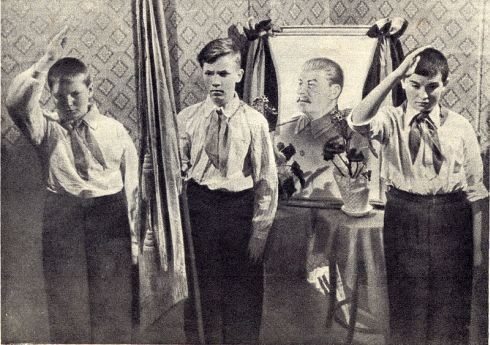
16. marts 1953
Den tyske revolutionære Paul Frölich dør i Frankfurt am Main. (født i Leipzig, 7. august 1884, se denne dato for links)
25. marts 1953
Skribenten og fredsforkæmperen Ellen Hørup dør i København. (Født i Kbh. 29. december 1871).
Links:
- Ellen Hørup. Af Helge Larsen (Denstoredanske.dk/Dansk Biografisk Leksikon)
- Ellen Hørup (1871-1953). Af Anette Faye Jacobsen (Dansk Kvindebiografisk Leksikon)
- Ellen Hørup – en kort biografi. Af Holger Terp (Det Danske Fredsakademi)
- Ellen Hørup (Gravsted.dk). Med kort biografi.
- Personalbibliografi over journalisten Ellen Hørup. Af Holger Terp (Det Danske Fredsakademi)
- Den glemte Hørup – Ellen Hørup og Mohandas Gandhi. Af Holger Terp (Fred.dk)
- De højere hensyn (pdf). Af Ellen Hørup (august 1937, genudgivet af Det Danske Fredsakademi, 4 s.).
Spain – the Battlefield of Capitalism. By Ellen Hørup, 1937. (Fred.dk). “Spain is kept down in ignorance, poverty, and dependence by the three equally mighty and equally corrupt powers: the Church, the Feudal System, and the Army.”
Litteratur:
Godt for sandheden, at alle ikke lever af at sælge flæsk: en biografisk fortælling om Ellen Hørup. Af Maria Grønløkke (Gyldendal, 2019, 211 s.). Se Margit Andersen: Journalisten og rebellen Ellen Hørup (Arbejderen.dk, 6. marts 2020). “I anden halvdel af 2019 er der udkommet hele to biografier om Ellen Hørup (1871-1953), som var både begavet og rebelsk og i sin tid en af de fremmeste inden for sit fag.”
Ellen Hørup: kvinden, verdensborgeren, rebellen. Af Lone Rünitz (Syddansk Universitetsforlag, 2019, 351 s.). Se Indholdsfortegnelse/Indledning (pdf) + anmeldelse af Jes Fabricius Møller: Veldokumenteret historie om holdningernes kvinde, men dramaets potentiale forløses ikke (Kristeligt Dagblad, 26. juli 2019) + Anette Eklund Hansen: Et bemærkelsesværdigt kvindeliv (pdf) (Arbejderhistorie, nr.1, 2020, s.129-131). Scroll ned.
Se også:
Se også på Socialistisk Bibliotek:
- Tidslinjen 22. maj 1841 om faderen Viggo Hørup.
Maj 1953
160 beboerer tvangsforflyttes fra Uummannaq (Dundas)-området ved Thule uden at grønlandske politikere, embedsmænd eller indbyggere er blevet spurgt.
Litteratur:
- Retten til Thulelandet. Af Chr. Harland mfl. (Forlaget Dike, 1999, 208 sider)
- Thule farvel: Tvangsflytningen i 1953. Af Per Walsøe. (Tiderne Skifter, 2003, 260 sider).
6. maj 1953
Tony Blair, engelsk premierminister 1997-2007, fødes i Edinburgh, Skotland.
Se:
- Blair, Anthony Charles Lynton (Tony) (Leksikon.org)
- Tony Blair (SourceWatch)
Blair’s destructive path. By Peter Taaffe (Socialism Today, Issue 142, October 2010). Review of Tony Blair’s autobiography: A Journey (Hutchinson, 2010)
Theme: Into the dustbin with Blair (Socialist Worker, Issue 2050, 12 May 2007; online at Internet Archive)
Theme: Britain after eight years of Blair (International Socialism, Issue 106, Spring 2005, p.35-111)
The woeful record of the House of Blair. By Michael Lavalette mfl. (International Socialism, Issue 90, Spring 2001, p.77-102; online at Marxists Internet Archive)
5. juni 1953
Danmarks Riges Grundlov af 5. juni 1953 vedtages.
Se på Socialistisk Bibliotek:
- 5. juni – Grundlovsdag og grundloven Emneliste med online link og bøger.
Se også:
- Danmarks Riges Grundlov: lov nr. 169 af 5. juni 1953.
17. juni 1953
Russiske tanks nedkæmper arbejderopstanden i Østberlin, startet pga. forøgelse af arbejdsnormerne.
På skandinavisk:
- Juniopstanden 1953 (Denstoredanske.dk)
- DDR 1953: Arbejderopstand mod det stalinistiske diktatur. Af Richard Lux (Socialistisk Information, nr. 178, juli 2003)
- Folkeoppstanden 17. juni 1953 (Wikipedia.no)
In English/Deutsch:
- Uprising of 1953 in East Germany (Wikipedia.org)
- 17 Juni 1953 (17juni1953.de). Einhalt: Chronik, Karte, Material, etc. “… Material ist als ein begleitendes “Handbuch” gedacht”. Material – Bibliographie.
East Germany 1953: Workers’ forgotten rebellion against Stalinism (Marxist Left Review, Issue 25, Autumn 2023). “Tess Lee Ack looks back at the workers’ uprising in June 1953, the first challenge to the Stalinist monolith in Eastern Europe.”
June 17, 1953. By Gareth Dale (Jacobin: Reason in Revolt, 17 June 2016). “On this day in 1953, a strike in Berlin turned into a nationwide rebellion for workers’ power in East Germany.”
Uprising in East Germany, 1953: shedding light on a major cold war flashpoint. A NSA Electronic Briefing Book, Edited by Malcolm Byrne, compiled by Gregory F. Domber (National Security Archive; The George Washington University, June 15, 2001)
The working class uprising in East-Germany June 1953 (1953). By Cajo Brendel (London, Echanges et Mouvement, [1990], 26 p.; online at Marxists Internet Archive). Review on book by Robert Havemann on the 1953 uprising.
An Alienated Man. By Colin Humphreys (International Socialism, No.69, May 1974; online at Marxists Internet Archive). Review of Robert Havemann’s book (Davis-Poynter, 1973)
1953-articles:
Germany 1953: Workers rise against Stalinist rule (Workers’ Liberty, Vol.3, No.40, June 2013, 20 p.). With articles from 1953-1954 by Hal Draper, Max Shachtman and others.
The June Days in review. By George Clarke (Fourth International, Vol.14, No.2, March-April 1953) + The East German Uprising. By the Editors (Vol.14, No.3, May-June 1953; online at Marxists Internet Archive)
The June Uprising by the East German Wrokers (pdf). By H.F. Stille (The New International, Vol. XIX. No.3, Whole No.159, May-June 1953, p.130-143; online at Marxists Internet Archive)
Litteratur:
Fem dage i juni: en roman om arbejderopstanden i DDR i juni 1953. Af Stefan Heym (Modtryk, 1978, 370 sider)
Se også / See also:
Digtet Løsningen af Bertolt Brecht, på Bertolt Brecht – socialist frem for alt (Socialistisk Revy, nr. 2, marts 1998, side 24) (+ Digtet på tysk og engelsk: Die Lösung/The Solution) (MR Zine, 14/08/06).
Se også på Socialistisk Bibliotek:
- Emneoversigt Tyskland / Germany
- Emneliste Berlinmurens fald, om Berlinmurens historie, dens fald i november 1989 og stalinismens sammenbrud i Østeuropa.
- Emnelisten Den Russiske Revolution 100 år
- Emnelisten Den Russiske Revolution, fra februar – oktober 1917
19. juni 1953
Ægteparret Ethel og Julius Rosenberg henrettes for spionage til fordel for Sovjetunionen.
Se på Socialistisk Bibliotek:
Emnelisten Rosenberg-sagen og McCarthyismen / The Rosenberg Case and McCarthyism
20. juli 1953
Storstrejke i den sovjetiske fangelejr i Vorkuta starter.
Links:
- Vorkuta uprising (Wikipedia.org)
- Vorkuta Gulag (Wikipedia.org)
Resistance and the everyday: reconsidering the Vorkuta prisoner strike of 1953 (pdf). By Alan Barenberg (The Havighurst Center for Russian & Post-Soviet Studies, Miami University, FLorida, USA, 36 p.)
1953: The gulag uprising at Vorkuta. By Raya Dunayevskaya (News & Letters, April 23, 1955)
The revolt in the slave labor camps in Vorkuta. By Raya Dunayevskaya (News & Letters, July 8, 1955)
‘Russia more than ever full of revolutionaries…’. In 1953 Russian slave laborers in Vorkuta acted: From the Writings of Raya Dunayevskaya. By Raya Dunayevskaya (News & Letters, July-August 2013; originally in Correspondence, June 12, 1954)
Litteratur:
Vorkuta (1959-53): Oppositional currents and the mine strikes, by Brigitte Gerland, in: Samizdat: Voices of the Soviet Opposition. Edited by George Saunders (Monad Press, 1974, p.217-234)
Se også / See also:
Trotskyists in Stalin’s concentration camps. By Sandy Boyer (SocialistWorker.org, March 7, 2011)
Trotskyists at Vorkuta: an eyewitness report (International Socialist Review, Vol.24, No.3, Summer 1963)
The Trotskyists in Stalin’s concentration camps: An eyewitness account of the strike at Vorkuta (1961). By MB (In Defence of Marxism, 15 December 2004)
How the Trotskyists fought and died in Stalin’s camps. By Suzanne Leonhard (Workers’ Liberty, 3 July 2013; originally in The Militant, 15 January 1951)
Gulag (Wikipedia.org)
Den højeste straf (Det Danske Filminstitut)
Holocaust: The ignored reality. By Timothy Snyder (The New York Review of Books, Vol.56, No.12, July 16, 2009). About the mass killings of European civilians during the 1930s and 1940s.
Kolyma: Det hvide krematorium (Gulag.dk)
Gulag i siffror (pdf). Av Anne Applebaum (Marxistarkiv.se, 9. december 2020, 7 s.). “Den text som återges nedan är ett Appendix från Anne Applebaums bok Gulag (2005).”
Se også på Socialistisk Bibliotek:
- Emneoversigten Rusland / Russia
- Tidslinjen 5. marts 1953, om Stalin / Stalinism
- Emnelisten Solsjenitsyn, Gulag og stalinismen
- Emnelisten Den Russiske Revolution 100 år
- Emnelisten Den Russiske Revolution, fra februar – oktober 1917
26. juli 1953
135 mænd fra befrielsesbevægelsen angreb Moncada-kasernen i Santiago de Cuba. De fleste blev dræbt og angrebet slået tilbage. Fidel Castro fængsles, hans forsvarstale i retten blev politisk program, for den senere ”26. Juli-Bevægelse”.
Se:
Historien vil frikende mig [tekst i uddrag; Castro Internet Archive/Internet Archive]. Engelsk fuldstændig udg.: History Will Absolve Me (Marxists Internet Archive).
Attack on the Moncada Army Barracks near Santiago de Cuba, July 26, 1953 (An excerpt from the book: “The Twelve” by Carlos Franqui Random House, New York. From the Introduction by Tana de Gámez (The Timetable History of Cuba; online at Internet Archive).
Litteratur:
Historien vil frikende mig: Fidel Castros forsvarstale i Santiago de Cuba den 16. oktober 1953. (Forlaget Demos, 1973, 100 sider).
Se også På Socialistisk Bibliotek:
- Emnelisten Fidel Castro og Cuba
- Emnelisten Fidel Castro (1926-2016)
27. juli 1953
Koreakrigen slutter med våbenhvileaftale.
Se:
- Koreakrigen (Leksikon.org)
Se på Socialistisk Bibliotek:
- Linkbox: Koreakrigen 1950-1953
12. august 1953
Med Sovjetunionens prøvesprængning af brintbomben, er våbenkapløbet udlignet og politisk er kommunistpartiernes udenrigspolitiske/militære rolle for USSR kraftigt nedtonet.
Se:
- Atomvåben (Leksikon.org)
- Kernevåben (Denstoredanske.dk)
- Kernevåben (Wikipedia.dk)
Se også:
- Oprustning (Leksikon.org)
19. august 1953
Iran: CIA’s kup sætter shahen tilbage på tronen (til 1979).
Se:
- Iran (Leksikon.org). Scroll ned til 1951 Mossadegh –
CIA afslører opskriften på et statskup. Af Poul Høi (Berlinske.dk, 29. september 2013). Detaljeret gennemgang af USAs vej til kuppet.
In English
- Mohammed Mossadegh (Wikipedia.org)
- The Mossadegh Project (Site)
- The Iran Documentation Project (The National Security Archive; The George Washington University)
The US destroyed Iranian democracy to uphold British imperialism. By Jack Taylor (Jacobin, 20 August 2023). “Seventy years ago this week, the US and the UK overthrew the Iranian leader Mohammad Mossadegh, who had fought back against British imperialism by nationalizing the oil company now known as BP. The UK has yet to acknowledge its role in this travesty.”
The end of British Empire in the Middle East. By Sheila McGregor (Socialist Worker, 16 January 2023). Review of Davis S. Painter and Grogory Brew, The Struggle for Iran: Oil, Autocracy, and the Cold War, 1951–1954 (The University of North Carolina Press, 2023, 324 p.). “A new book looks at the competing interests behind the Western coup that overthrew Iran’s government in 1953.”
A prize from fairyland. By Andrew Bacevich (London Review of Books, Vol.39, No.21, 2 November 2017). Review of James Van Hook (ed.), Foreign Relations of the US, 1952-54, Iran, 1951-54 (United States Government Publishing Office, Chiron Academic Press, 2017, 970 p.). See Office of the Historians for the documents online.
The Iranian coup, 1953 (Libcom.org, December 14, 2016). Excerpted from Stephen Kinzer: Overthrow: America’s century of regime change from Hawaii to Iraq (Barnes & Noble, 2007)
Iran coup: Tudeh’s inglorious role. By Torab Saleth (Weekly Worker, Issue 941, December 6, 2012). Review of Ervand Abrahamian, The Coup: 1953, the CIA and the Roots of Modern US-Iranian Relations (New Press, 2013)
A crass and consequential error. By Roger Cohen (The New York Review of Books, Vol.59, No.14, September 27, 2012). Review of Christopher de Bellaigue, Patriot of Persia: Muhammad Mossadegh and a Tragic Anglo-American Coup (Harper, 2012)
When Uncle Sam went to Iran. By Peyman Jafari (Socialist Review, Issue 297, November 2003; online at Internet Archive). Review of Stephen Kinzer, All the Shah’s Men (John Wiley & Sons, 2003).
The spectre of Operation Ajax. By Dan De Luce (The Guardian, August 20, 2003). “Britain and the US crushed Iran’s first democratic government. They didn’t learn from that mistake.”
50 years after the CIA’s first overthrow of a democratically elected foreign government (Democracy Now! August 25, 2003). “We take a look at the 1953 US backed coup in Iran.”
Overthrow of Premier Mossadeg of Iran, November 1952-August 1953, CIA Clandestine Service Historical Paper No. 208, March 1954. Declassified in 2000 (Cryptome.org)
A ‘great venture’: overthrowing the government of Iran (Lobster, Issue 30, December 1995). Extract from Mark Curtis, The Ambiguities of Power: British Foreign Policy since 1945 (Zed Press, 1995)
See also:
Iran’s past and present (Jacobin: Reason in Revolt, 20 April 2017). Interview with Ervand Abrahamian: “Why has the history of Iran’s left been erased?”
Se også på Socialistisk Bibliotek:
- Emnelisten Iran 1979
- Emelisten Oprøret i Iran 2009
3. september 1953
Den europæiske Menneskerettighedskonvention træder i kraft.
Se:
- Den eropæiske Menneskerettighedskonvention (Denstoredanske.dk)
- Den Europæiske Menneskerettighedskonvention (Wikipedia.dk)
- European Convention on Human Rights (Wikipedia.org). Mere uddybet engelsk tekst.
7. september 1953
Stalins chefbøddel og politichef (fra 1938) Lavrentij Berija (født 29.3.1899) arresteres. Han henrettes (23.12.1953) for mangeårig spionvirksomhed til fordel for briterne osv osv.
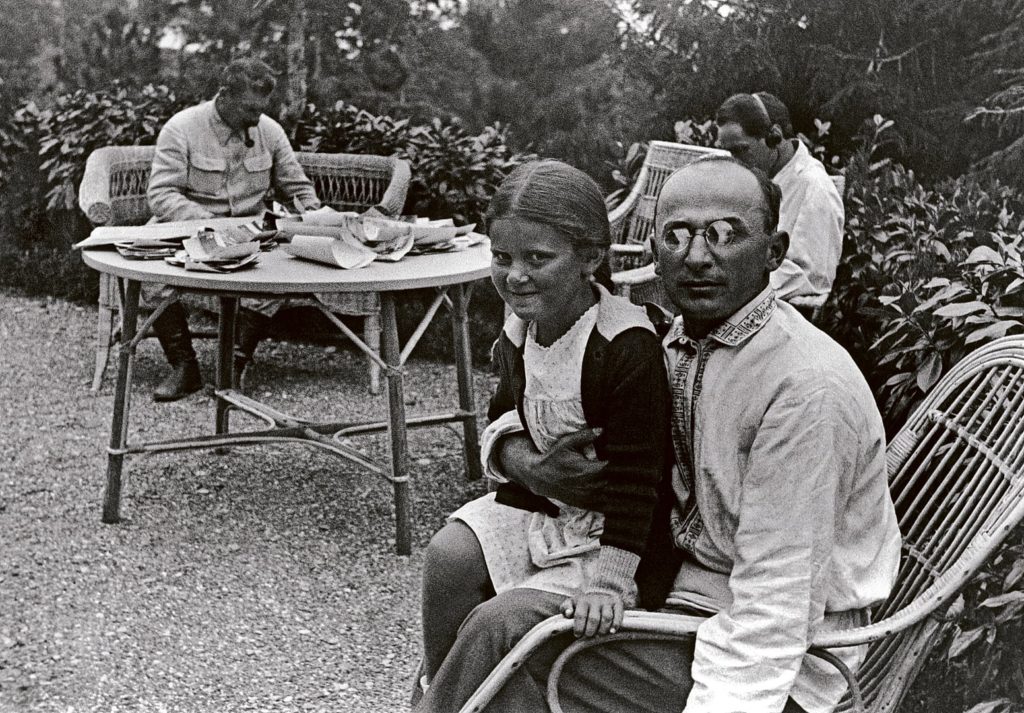
Se:
- Berija, Lavrentij Pavlovitj (Leksikon.org)
- Lavrentij Pavlovitj Berija (Denstoredanske.dk)
- Lavrentiy Beria (Wikipedia.org)
- Lavrenty Beria (Spartacus Educational)
- Lavrenti Beria, 1899-1953 (Marxists Internet Archive)
Berija – Stalins bøddel. Af Kristian Hansen (Historie-online.dk). Anmeldelse af Amy Knight: Berija – Stalins bøddel (Det Schønbergske forlag, 2005, 432 s.). “Amy Knight har med værket her kastet nyt lys over en spændende, om end grusom person. Med brug af en del nye kilder har hun formået at konstruere en velafbalanceret bog.”
Beria’s trial: The old show? By Isaac Deutscher (The Reporter, 2 February 1954; online at Marxists Internet Archive). “The post-Stalin era is only at its beginning. After a brief quasi-liberal spell Stalin’s successors have already tried to conjure up the spirit of the Stalin era, but they have already half-demonstrated the impossibility of this task.”
The Beria Purge. By Raya Dunayevskaya (Correspondence, October 3, 1953; online at Marxists Internet Archive). “Today the ruling bureaucracy is not the integrated whole it was in 1938. It is split all ways between Zhdanov men, Malenkov men, Beria men, and-not to be forgotten although little known at present-Khrushchev men.”
27. november 1953
Den danske ekspressionistiske forfatter Emil Bønnelycke dør i København (født 21.3.1893 i Århus). Hovedværker er hyldesten til den moderne storby Asfaltens Sange (1918) og antikrigsromanen Spartanerne (1919, genudgivet, se nedenfor).
Affyrede 4. februar 1919 tre revolverskud under oplæsning af digtet “Rosa Luxemburg”. Se digtet online
Bønnelycke var også i redaktionen og bidragsyder til det kulturradikale tidsskrift Klingen (udkom 1917-1920). Læs om tidsskriftet i Morten Things indskannede artikel her, hvor der er link til online udgave på Det Konglige Bibliotek/Projekt Runeberg.
Se på Socialistisk Bibliotek:
Tidslinjen 4. februar 1919 om digtoplæsningen af digtet over Rosa Luxemburg.
Se links:
Rosa Luxemburg. Prosalyrisk symphoni pathetique in memoriam (København: Chr. Christensen, 1919, 54 s.). Indskannet på Socialistisk Bibliotek, 31. december 2018). – Og citat herfra:
Varna: Artikler 1919-1942 (Tanker i gang). Scroll ned til Emil Bønnelycke.
Biografi: Emil Bønnelycke (DR Skole / Tema: Danske digtere)
Emil Christian Theodor Bønnelycke (Gravsted.dk). Med kort biografi.
Emil Bønnelycke (Denstoredanske.dk)
Emil Bønnelycke (Dansk Biografisk Leksikon)
Emil Bønnelyske (Wikipedia.dk)
Fartens og forvirringens skønhed – Emil Bønnelycke. Af Lasse Horne Kjeldsgaard (Dansk litteraturs historie)
Litteratur:
Aarhundredet (Asfaltens Sange, 1918)
Gaden (pdf). Af Emil Bønnelycke, 1917 (Sprog til litteraturen, Gyldendal)
Emil Bønnelycke. Af Paardekooper. I: Stemmer og sten ved Vestre Kirkegård. Digte (Biblioteket Øverste Kirurgiske, 2003, 72 s.)
Spartanerne, + Rosa Luxemburg + Berlin. Af Emil Bønnelycke (Gladiator, 2016, 331 sider) (Sandalserien/Gladiator, nr. 9). Side 297-313: “Rosa Luxemburg. Prosalyrisk Symphoni Pathatoqie in Memoriam” (indskannet på Socialistisk Bibliotek, 31. december 2018). Se anmeldelse af Mikkel Bruun Zangenberg: Genudgivelse af dansk krigsromanforfatter er ganske enkelt fremragende (Politiken.dk, 3. juni 2016). “Den kristne avantgardist og Politiken-skribent Emil Bønnelycke genudgives af Gladiator.”
Se også:
Perioder: Ekspressionisme. Af Louise Rosengreen (Forfatterweb)
8. december 1953
Den amerikanske politolog og forfatter Norman Finkelstein fødes i Brooklyn, New York.
Se:
- Norman E. Finkelstein (Wikipedia.org)
- The Official Website of Norman G. Finkelstein (Normanfinkelstein.com). Blog, Books, Bio.
- Norman Finkelstein i DR2 Deadline med Adam Holm (13. november 2009). Se interviewet på Eigils Blog (9:11 min.).
“Den væsentligste faktor er palæstinenserne selv” (Eftertryk, 1. maj 2017). “Eftertryk bringer her et interview med den amerikanske-jødiske forfatter Norman Finkelstein. Han var på besøg i København i februar for at afholde en række foredrag.”
Straf og ydmygelse som politisk strategi. Af Michael Irving Jensen (Information.dk, 20. juni 2015). Anmeldelse af Norman G. Finkelstein: Method and Madness: The Hidden Story of Israel’s Assaults on Gaza (OR Books, 2015, 215 p.). “Historien om Israels systematiske angreb på Gazastriben kommer under lup i ny velskrevet bog af den jødisk-amerikanske forsker Norman Finkelstein, der igen viser, at den kritik, Israel frygter mest, er den fra egne rækker.”
På vej væk fra Israel. Af Lars Ploug (Palæstina-Orientering, nr.3, september 2012, s.8-10; online på DocPlayer). “Den bærende pointe i Norman Finkelsteins nyeste bog, Knowing Too Much er, at amerikanske jøder er i færd med at distancere sig fra Israel. Ifølge Finkelstein tyder tal og tendenser på, at amerikanske jøders engagement i Israel som stat og projekt er under afvikling.” Scroll ned.
Finkelsteins sans for detaljer. Af Lars Ploug (Modkraft.dk, 19. oktober 2005). Anmeldelse af Norman G. Finkelstein, Beyond Chutzpah: On the Misuse of Anti-Semitism and the Abuse of History (University of California Press, 2005, 343 p.). “Hvor Holocaustindustrien efter min opfattelse på en og samme tid løftes og skæmmes af Finkelsteins vrede og hans polemiske opgør på forældrenes vegne er Beyond Chutzpah en langt mere analytisk bog.”
Det store spørgsmål. Af Cecilie Banke (Information.dk, 29. marts 2001). “Amerikaneren Norman G. Finkelsteins bog om Holocaust-industrien rejser måske en relevant debat, men giver ingen svar på det spørgsmål, som for en europæer forbliver det vigtigste. Hvordan kunne Holocaust ske?” Se debat: Det store spørgsmål. Af Morten Thing (Information.dk, 4. april 2001).
Holocaust til salg. Af Morten Thing. Anmeldelse af Finkelsteins Holocaustindustrien (Social Kritik, nr. 75, 2001, s.74-76). Indholder nogle af punkterne fra ovenstående debat-indlæg + om det ikke-enestående ved det jødiske folkemord ift. andre folkemord. P.t. ikke online; genoprykt i: Ta’ mig lige lidt på ordet: udvalgte artikler gennem 50 år. Af Morten Thing (Politisk Revy, 2020, s.298-303).
60-året for Krystalnatten + interview med Norman Finkelstein om ‘tyskernes kollektive ansvar’ (Socialistisk Revy, nr.10, december 1998). “Nogle historikere påstår, at antisemitisme var så dybt integreret i det tyske folk, at alle tyskere havde medansvar for holocaust. Vi bringer et interview med den amerikanske socialist og jøde, Norman Finkelstein, der i sin bog A Nation on Trial argumenterer imod denne teori.” Scroll ned.
Norman Finkelstein’s new book on Gaza is a meticulous account of Israel’s crimes. By James North (Mondoweiss, January 25, 2018). Review of Norman Finkelstein, Gaza: An Inquest Into Its Martyrdom (University of California Press, 2018, 440 p.). “… the cumulative impact of Finkelstein’s meticulously-documented chronicle is devastating, and it will leave the reader stunned that the worldwide reaction is so muted.”
Explaining the holocaust industry (Weekly Worker, Issue 1124, 29 September 2016). “Norman Finkelstein recalls how the official narrative on the Jews and Israel has changed over his lifetime.”
A broken romance?: Israel and American Jews. By David Finkel (New Politics, Issue 58, Winter 2015). Review of Norman Finkelstein, Old Wine, Broken Bottle: Ari Shavit’s Promised Land (OR Books, 2014, 83 p.) + Knowing Too Much: Why the American Jewish Romance with Israel is Coming to an End (OR Books, 2012, 454 p.). “If the demolition of Shavit is a quick and breezy read, Knowing Too Much is a challenging text, which Finkelstein has described as his most important book.”
Norman Finkelstein on Joan Peters legacy (and Dershowitz’s legal troubles). By Adam Horowitz (Mondoweiss, January 28, 2015). “I interviewed Norman Finkelstein and asked him to reflect on Joan Peters, From Time Immemorial: The Origins of the Arab-Israeli Conflict over Palestine, as he played a central role in debunking much of her work as described in his book Image and Reality of the Israel-Palestine Conflict (Verso, 2003, 287 p.).”
American Radical: The Trials of Norman Finkelstein (Wikipedia.org). “A 2009 documentary film about the life of the American academic Norman Finkelstein, directed and produced by David Ridgen and Nicolas Rossier. The documentary features Finkelstein and several of his supporters and opponents, including Noam Chomsky and Alan Dershowitz.”
“Just the Facts”: Interview with Norman G. Finkelstein. By M. Junaid Levesque-Alam (MR Online, September 28, 2008). “In our hour-long phone interview on September 14, Finkelstein discussed a broad range of topics, including Gaza, the paralysis gripping the Arab world, and the reach and the limits of the Israeli lobby.”
Noam Chomsky accuses Alan Dershowitz of launching a “jihad” to block Norman Finkelstein from getting tenure at DePaul University (Democracy Now!, April 17, 2007). “In the interview, we ask Chomsky about Harvard law professor Alan Dershowitz, who is lobbying DePaul faculty members to oppose Norman Finkelstein’s bid to receive tenure.” Audio, video, text.
Interview with Prof. Norman Finkelstein (The Electronic Intifada, 25 May 2006). Christopher Brown interviews Norman Finkelstein: “Prof. Finkelstein, in your estimation why does it seem that when someone challenges Israel on its policies towards the Palestinians they are accused of anti-Semitism?”
Israel’s advocates in the dock. By Ruth Tenne (International Socialism, Issue 111, Summer 2006). Review of Norman Finkelstein, Beyond Chutzpah: On the Misuse of Anti-Semitism and the Abuse of History (Verso, 2005, 356 p.). “[The book] offers a gripping, scholarly account of the extent to which the charge of anti-Semitism has become a weapon readily used by the Israeli lobby to fend off a genuine criticism of Israel’s policies …”
Scholar Norman Finkelstein calls professor Alan Dershowitz’s new book on Israel a “hoax” (Democracy Now!, September 24, 2003). “Today Norman Finkelstein takes him on and charges that Dershowitz makes numerous factual errors in his book. Dershowitz denies the charges.” Audio, video, text.
How to lose friends and alienate people. By Don Atapattu (CounterPunch, December 13, 2001). Interview with Norman Finkelstein: “Professor Norman Finkelstein is one of a dying breed of American mavericks that relentlessly defies any attempt at easy categorization.”
Where Goldhagen goes wrong (Socialist Review, Issue 212, October 1997; online at Internet Archive). Kevin Ovenden interviews Norman Finkelstein: “Daniel Goldhagen in his book Hitler’s Willing Executioners talks of the Holocaust stemming out of what he calls an ‘exterminationist anti-Semitism’, a particularly virulent form of anti-Semitism laid down among the German people during the 19th century. Can you explain what Goldhagen means by that and what is wrong with his argument?” See also Letters (Issue 213, November 1997).
Se også på Socialistisk Bibliotek:
- Tidslinjen 5. juni 1967 om seksdageskrigen i 1967.
- Bogen The Politics of Anti-Semitism online.
- Linkboxen Defamation – en dokumentarfilm om antisemitisme (interview med bl.a. Norman Finkelstein).
- Emnelisten Israels blodige krig mod Gaza’s folk (med flere bidrag af Norman Finkelstein).
- Linkboxen Zionisme – Antizionisme: Historien om racisme og etnisk fordrivelse (med flere bidrag af Norman Finkelstein).
- Linkboxen Israel 1948 og Nakbaen (katastrofen) (med flere bidrag af Norman Finkelstein).

















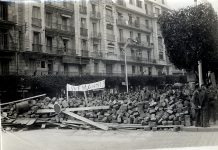
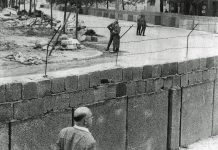

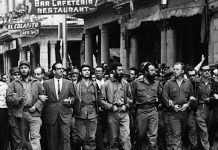













![Illustration to Robert Burns' poem Auld Lang Syne by J.M. Wright and Edward Scriven. The Complete Works of Robert Burns: Containing the Poems, Songs, and Correspondence. Illustrated By W.H. Bartlett, T. Allom, and Other Artists. With a New Life of the Poet, and Notices, Critical and Biographical[1] by Allan Cunningham. Published in London by George Virtue. No year is given explicitly, but "James Gibson 1856" has been handwritten inside the front cover, it's dedicated to a MP, Archibald Hastie of Paisley, who was no longer a MP by 1857, and some of the artists and engravers were dead before 1842. As such, I'm going with c. 1841 as the year, though it could be as late as 1856, when James Gibson evidently acquired. From: The Complete Works of Robert Burns: Containing the Poems, Songs, and Correspondence. Illustrated By W.H. Bartlett, T. Allom, and Other Artists. With a New Life of the Poet, and Notices, Critical and Biographical by Allan Cunningham, London: George Virtue. Drawn by John Masey Wright (1777–1866, artist), Engraved by John Rogers (c. 1808-c. 1888, engraver), Restored by Adam Cuerden (1979–, restorationist), Cropped by Beyond My Ken. Public Domain.](https://socbib.dk/wp-content/uploads/2018/02/John_Masey_Wright_-_John_Rogers_-_Robert_Burns_-_Auld_Lang_Syne_crop-100x70.jpg)